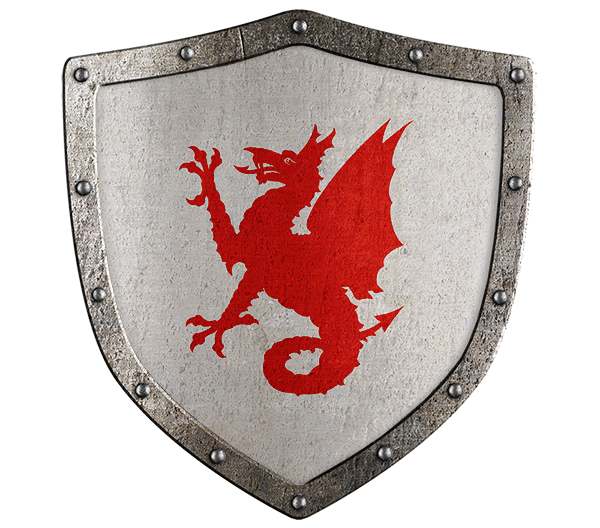THE KNIGHTS OF THE ROUND TABLE
King Arthur
Often overlooked because of his role as King, husband and epic legend, is the knight Arthur himself: the ruler of the land and yet the head of the Round Table. The first knight among equals.
The name Arthur is almost certainly a derivative of the name Artorius, a Roman gens name, but according to J. D. Bruce, it possibly came from the name “Artos Viros” (bear man), which is from Celtic origin. Bruce also suggest the possibility of a connection with Irish art (stone).
King Arthur was the son of Uther Pendragon and according to many legends defeated the barbarians in dozens of battles. Subsequently, he conquered a wide empire and eventually went to war with the Romans. He returned home on learning that his nephew Mordred had raised the standard of rebellion and taken Guinevere, the Queen. After landing, his final battle took place.
Legendary King Arthur the Knight
Tradition has it that after King Uther’s death there was no king ruling all of England. Merlin had placed a sword in a stone, saying that whoever drew it out would be king. Arthur did not know his true status but had grown up living with Sir Ector and Sir Kay, his son. The young Arthur pulled the sword from the stone and Merlin had him crowned the King of Britain. This led to a rebellion by eleven rulers which Arthur put down. He married Guinevere, whose father gave him the round table as a dowry.
Merlin had placed a sword in a stone, saying that whoever drew it out would be king. Arthur did not know his true status but had grown up living with Sir Ector and Sir Kay, his son.
In the war against the Romans, Arthur defeated Emperor Lucius and became emperor himself. The last battle of Arthur took place between He and the forces of his evil nephew, Mordred. Arthur delivered the fatal blow to Mordred in the battle, but in the process Arthur was struck a mortal blow, himself. It was then that he commanded Sir Bedivere to throw Excalibur back into the Lake.
According to History
The date of Arthur’s death is given by Geoffrey of Monmouth in the History of the Kings of Britain as AD 542. Thomas Malory places his life and death in the fifth century, and yet Geoffrey Ashe puts forward the argument that King Arthur is, at least to some extent, to be identified with the historical Celtic king Riothamus, who was active around AD 470 and worked with the Romans rather than battling against them.
Was Arthur fictitious or did he really live? Was he really a composite of a number of persons living at different times in British history or a standalone hero for the ages? We’ll really never know, but Arthur, both the knight and the King, is one that lives on as an icon for truth, justice and goodness throughout the ages. And whether we truly believe in the historical Arthur or not, that is for all of us to decide for ourselves.


